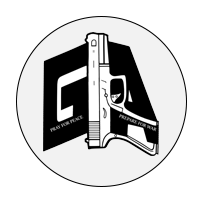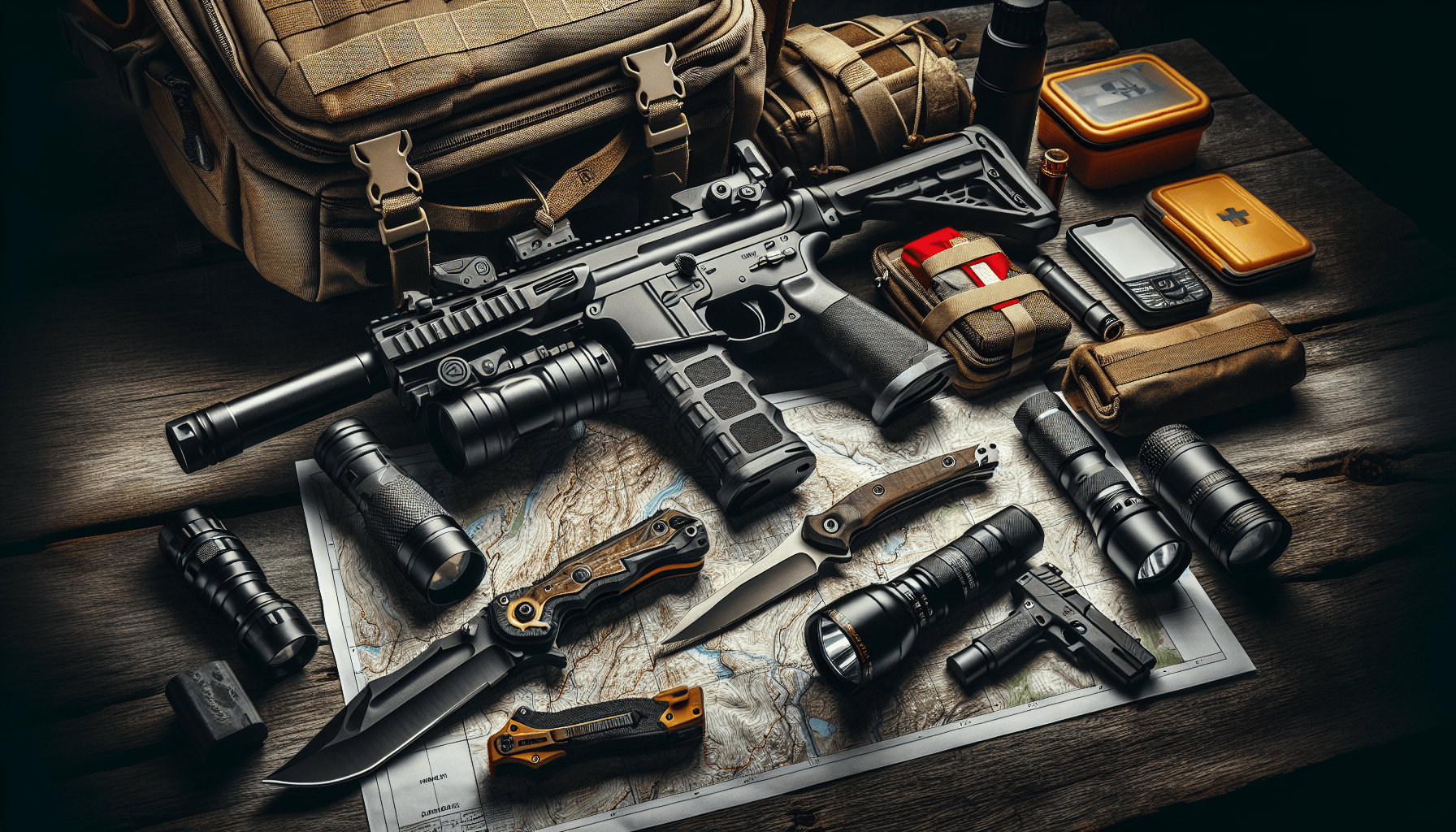Have you ever considered what it truly means to be prepared for a survival situation? It’s not just about having canned goods and bottled water stocked in your basement. No, survival preparedness is an intricate mesh of skills, tools, and knowledge that ensures you and your loved ones can withstand and navigate through unexpected adversities. Whether you’re thinking about natural disasters, societal unrest, or even a zombie apocalypse, it’s crucial to consider multiple facets of preparation. Let’s take a friendly journey together to unravel the nuances of survival preparedness, focusing specifically on firearms and other indispensable tools.

The Art of Being Prepared: An Overview
Your first instinct might be to roll your eyes or dismiss the need for such preparation altogether. But let me assure you, being prepared isn’t about living in fear—it’s about the peace of knowing you’ve got a plan. The right tools and training can spell the difference between a minor inconvenience and a catastrophic event.
Breaking Down the Basics
Survival preparedness involves four major components:
- Knowledge and Skills
- Firearms and Ammunition
- Essential Tools and Supplies
- Training and Practice
Each of these plays a critical role in the creation of a robust survival strategy.
Why Firearms?
The mere mention of firearms can polarize a dinner table conversation faster than politics or pineapple on pizza. Like it or not, firearms can be a potent means of protection and hunting in survival situations. They’re not the be-all and end-all, but having—and knowing how to use—a firearm can provide immense advantages.
Firearms: Your Defensive Backbone
For those of you unfamiliar with the varieties of firearms, stepping into this world can feel like drinking from a firehose. You have handguns, shotguns, rifles, and each has its quirks and benefits. Let’s break it down to make it more digestible.
Types of Firearms
| Type | Use Case | Pros | Cons |
|---|---|---|---|
| Handguns | Self-defense, compact use | Portable, easy to conceal, versatile | Limited range |
| Shotguns | Home defense, hunting | Powerful, wide spread, reliable | Bulky, limited ammo capacity |
| Rifles | Long-range defense, hunting | High accuracy, powerful, versatile in range | Heavy, less portable |
Selecting the Right Firearm
When picking out a firearm, think of it like shopping for shoes. A one-size-fits-all approach won’t cut it. Your choice should take into account your specific needs, environment, and comfort level. If you’re in Pensacola, Florida, I recommend visiting Green Line Arms at 1350 South Blue Angel Pkwy. Their expert staff can guide you through the selection process, ensuring you find a firearm that fits just right.
Importance of Ammunition
Just like you wouldn’t buy a car and never refuel it, you can’t have a firearm without ammunition. Selecting the right ammo is an art form in itself. It’s essential to understand the type of ammunition compatible with your firearm, as well as its effectiveness for your intended use.
Safe Storage and Maintenance
It’s not enough to own a firearm; you must also know how to store and maintain it properly.
- Storage: Always keep firearms unloaded and locked away when not in use. Ensure that they are out of reach of children or unauthorized users.
- Maintenance: Regularly clean and oil your firearm to ensure it functions correctly. An unclean firearm is as useless as an uncharged phone in an emergency.
Essential Tools Beyond Firearms
While firearms can be a keystone in survival preparedness, undervaluing other essential tools would be like trying to make a cake with just flour. Let’s delve into the world of non-firearm prep tools that can significantly amplify your survival odds.
First Aid Kits
A well-stocked First Aid kit isn’t just a luxury; it’s a necessity. Whether you’re dealing with minor scrapes or more severe injuries, a first aid kit can make a world of difference. Here’s a quick checklist of what yours should contain:
- Bandages and gauze
- Antiseptics
- Pain relievers
- Tweezers and scissors
- Emergency blankets
- CPR mask
Consider taking a first aid course to familiarize yourself with these items. And again, if you’re around Pensacola, don’t miss the chance to drop by Green Line Arms for some top-notch first responder medical tips.
Multipurpose Tools
Think of a Swiss Army knife but on steroids. Multipurpose tools like Leatherman kits can serve several functions in survival situations. From cutting ropes to opening jars or even defending yourself, these tools are compact lifesavers.
Lighting
Imagine trying to start a fire or read a map in utter darkness. It’s not exactly the fun adventure you’re envisioning. Battery-powered lanterns, flashlights, or even LED headlamps can be invaluable. Don’t forget extra batteries!
Water Purification
Water is life, plain and simple. In a survival scenario, access to clean water can’t be taken for granted. Water purification tablets or portable filtration systems like Lifestraw can mean the difference between hydration and dehydration.
Fire Starting Tools
Fire keeps you warm, cooks your food, and even serves as a signal for rescue. Make sure to have multiple ways to start a fire, such as waterproof matches, lighters, and fire starter kits.
Emergency Communication Devices
Whether it’s a CB radio, walkie-talkies, or even a simple whistle, communication can be critical in emergencies. These devices can help you stay in touch with loved ones or get the help you need.
Building Your Knowledge and Skills
No tool, no matter how sophisticated, is ever more valuable than the knowledge and skills you possess. Learning to use your tools effectively can be a game-changer.
Firearms Training
Going to the shooting range isn’t just a one-off activity; it should be a regular part of your routine. If you’re nearby, Green Line Arms provides exceptional training programs that cater to all skill levels. They even boast a cutting-edge virtual shooting range that can simulate various scenarios for a more comprehensive training experience.
First Aid and Medical Skills
In an emergency, professional medical help might not be immediately available. Knowing basic first aid can save lives. Consider taking a course in first responder medical training. Understanding how to dress wounds, perform CPR, and treat shock are just the basics you should aim to master.
Wilderness Survival Skills
While society has made life pretty convenient, having some primitive skills can never hurt. Learn how to:
- Build a shelter
- Forage for food
- Navigate using natural signs
- Purify water without modern tools
Communication Skills
In turbulent times, clear communication with other people can be crucial. Learn how to use CB radios or other forms of emergency communication. Practice signaling for rescue using simple tools like mirrors or whistles.
Regular Drills
Practice makes perfect—or, if not perfect, at least prepared. Regular drills can solidify your skills, making actions second nature during an actual emergency. Engage your family in these drills to ensure everyone knows what to do.

Mastering the Psychology of Survival
Skills and tools are essential, but so is your mental state. Understanding the psychological aspect of survival can be the last piece of your preparedness puzzle.
Staying Calm Under Pressure
Easier said than done, staying calm is pivotal. Panic leads to mistakes, and mistakes can be costly. Train your mind to remain focused and calm through stress-relief exercises, meditation, or even some form of martial arts.
Mindset Training
A resilient mindset can make a considerable difference. Think of survival as a challenge rather than a threat. Regularly visualize positive outcomes and successful scenarios. This mental simulation can prepare your mind to act efficiently when the time comes.
Group Dynamics
If you’re part of a family or community group preparing together, understanding group dynamics is crucial. Know the strengths and weaknesses of each member. Assign roles and responsibilities so everyone knows their part in the plan.
Seeking Expert Advice
You don’t have to navigate this complex landscape alone. Consulting with experts can provide you with customized guidance tailored to your specific needs.
Consulting with Green Line Arms
Specialists like those at Green Line Arms can offer invaluable advice. Whether you need tips on choosing the right firearm, first responder medical wisdom, or custom survival gear, experts can steer you in the right direction. Their dedication to building a safer community through responsible gun ownership and advanced training programs makes them a reliable resource.
Online Forums and Communities
Joining online forums or survival prep communities can also be beneficial. These platforms are treasure troves of information where you can ask questions, exchange tips, and even participate in virtual discussions or webinars.
Conclusion: Preparedness as a Lifestyle
Survival preparedness isn’t just a one-time ritual but an ongoing lifestyle. Continually updating your knowledge, skills, and tools can keep you ahead of the curve. It’s not about fostering fear but about building confidence and peace of mind.
If you’re serious about taking your preparedness to the next level, visit Green Line Arms at 1350 South Blue Angel Pkwy in Pensacola, Florida. Their extensive range of firearms, ammunition, and expert training programs can provide you with everything you need to ensure your readiness. Remember, while we pray for peace, we must also prepare for any eventuality.




